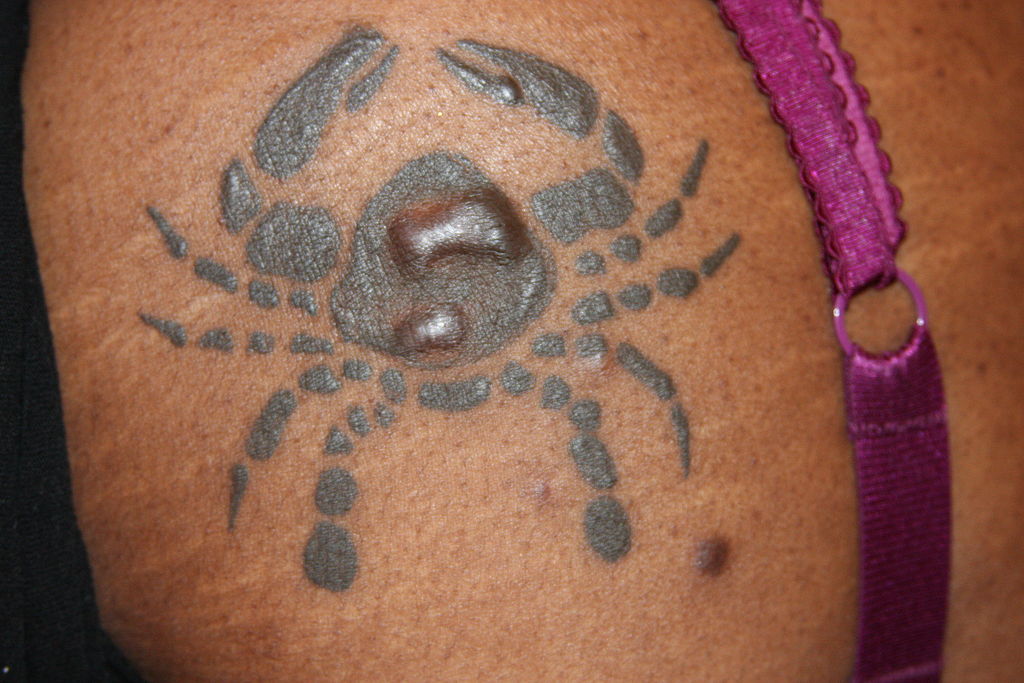Tattoos involve puncturing your skin hundreds of times with needles to insert permanent ink. With this skin trauma comes the risk of infections. This begs the question, “Can Tattoo Cause Infection?”
The straight-up answer is, “Yes, tattoos can cause infection.” But just how common are tattoo infections, what causes them, and how can you prevent and treat them?
This guide will cover everything you need to know about potential tattoo infections, symptoms to watch for, and aftercare best practices to speed up healing and avoid complications.
How Tattoos Can Get Infected
Before going under the tattoo gun, it’s important to understand how infections can occur. Here are the main causes:
- Unsanitary Equipment – Reused ink or needles, contaminated tattoo machines, and poor sterilization protocols can expose you to bacteria and viruses.
- Unclean Environment – Shops and stations cluttered with dirt, blood, bodily fluids, and uncovered surfaces contain high levels of germs.
- Inexperienced Artists – Improper tattoo technique causes excess skin trauma. Heavy-handed overworking of the skin during tattooing increases infection risks.
- Poor Aftercare – Failing to properly clean, disinfect, moisturize, and protect new tattoos leads to harmful bacteria introduction.
- Impaired Healing – Certain health conditions like diabetes and weakened immune systems impair your body’s ability to heal quickly and resist infections.
- Existing Skin Conditions – Skin issues like eczema, rashes, sunburns, and acne can become easily infected during tattooing.
Also Read: Can expired tattoo ink cause infection
Signs of a Tattoo Infection
How can you tell if your new ink is infected rather than just inflamed from ordinary healing? Watch for these symptoms:
- Redness extending beyond the tattooed area
- Swelling, especially if it’s increasingly worsening
- Excessive hotness radiating from the tattoo site
- Green/yellow fluid oozing from the tattoo
- Expanding rash surrounding the tattoo
- Unusual bruising spreading outward
- Intense pain not relieved by OTC medication
- Oral antibiotics fail to stop the progression
Also Read: Can tattoo ink really go bad?
When to See a Doctor
At the first signs of a suspected infection, promptly contact your tattoo artist and doctor. Skin infections require professional medical attention.
Left untreated, tattoo infections can rapidly escalate, ultimately damaging your skin and underlying tissues. Seek emergency care if you experience:
- High fever paired with chills.
- Difficulty breathing.
- Dizzy spells and confusion.
These signal a systemic blood infection that requires hospitalization for intravenous antibiotics.
Tattoo Infection Risk Factors
Certain circumstances and conditions raise your risks of developing an infected tattoo, including:
- Getting inked in unlicensed, amateur studios
- Being tattooed at home or a DIY tattoo
- Having an illness like hepatitis that’s transmittable via blood
- Medical issues like heart/kidney disease and immunosuppression
- Skin damaged from sunburns, eczema, and piercings
- Lack of access to clean water for aftercare
- Diabetes and other metabolic disorders
- Age (65+), pregnancy, and adolescence
- Tattoos over joints and high friction/movement areas
- Extensive tattoo sessions over 4+ hours
Also Read: Can you use out of date tattoo ink?
Common Bacterial Infections
Due to how deeply tattoo needles penetrate, most tattoo-related infections involve bacteria rather than viruses. The most common culprits are:
- Staphylococcus – Commonly resides on the skin’s surface and surrounding environment. Causes delayed-onset infections.
- Pseudomonas – Invades via contaminated water/fluids. Creates green/black skin discoloration.
- Streptococcus – Group A strep is pervasive and usually enters through open cuts and wounds.
- Mycobacterium – Tuberculous mycobacterium (TB) is rare but highly contagious.
- Acinetobacter – Bacteria commonly transmitted in healthcare settings through contact.
- MRSA – Antibiotic-resistant staph found in crowded public settings like jails, dorms, and gyms.
Also Read: Saniderm tattoo bandage how long should you keep them on
Treating Tattoo Infections
Having seen the answer to the query, “Can tattoo cause infection?”, how then can you treat the infections caused by tattoos?
At the first sign your tattoo appears infected, immediately wash the area with antibacterial soap and contact your doctor. They can culture any fluid drainage to pinpoint the particular bacterial strain.
Oral antibiotic pills or creams specifically tailored to that bacteria are prescribed for several weeks until your tattoo heals fully. Over-the-counter topical ointments can support prescription treatments but aren’t strong enough alone to resolve infections.
For mild cases, your doctor may recommend waiting 1-2 days to see if your body can fight off the infection without antibiotics.
However, worsening pain, swelling, heat, red streaks, and pus signals an infection is spreading and requires urgent treatment. Ignoring these warning signs can have permanent consequences.
Also Read: Is it safe to get a tattoo if I have a medical condition?
Preventing Tattoo Infections
The best cure is prevention. These proactive steps will help you avoid tattoo infections entirely:
- Vet tattoo studios thoroughly and read reviews. Avoid homemade tattoos.
- Confirm studios are licensed, accredited, and maintain stringent sanitation practices.
- Ensure inks are poured into disposable plastic cups. Pigments should never be accessed directly.
- All equipment should come out of sterilized sealed bags and be used only on you.
- Only allow reputable tattoo artists with excellent technique and training to ink you.
- Verify studio floors, chairs, tables, and countertops are properly disinfected.
- Examine your artist’s hands to confirm no open cuts or wounds are present.
- Check for current accreditation certificates from agencies like the Alliance of Professional Tattooists (APT).
- Review aftercare instructions carefully. Follow them diligently during healing.
- Allow major gaps of 1-2 months between large tattoo sessions to limit skin overwork.
- Carefully monitor your tattoo and don’t hesitate to contact your doctor at the earliest symptom onset.
- When selecting where to get your tattoo, the studio’s diligence regarding sterilization and infection prevention should be your top priority. This guides the rest of their practices. A single reused ink cap or contaminated tattooing station can impose life-long health consequences.
Caring for Healing Tattoos
Promoting quick, healthy healing vastly reduces your infection risks. Be meticulous about proper aftercare:
- Ask your artist for recommended topical healing ointments and products. Apply as directed.
- Wash hands thoroughly before touching tattoos or applying ointments/bandages.
Use warm water and unscented antibacterial soap 2-3x daily to gently cleanse your tattoo. Avoid harsh scrubbing. - Rinse off all soap residues since soap can breed bacteria in pores. Dry with clean paper towels.
- Apply a thin layer of ointment 1-3x daily depending on dryness. Too much can block oxygen from reaching your tattoo.
- Keep the tattoo covered when showering. Avoid direct high-pressure water contact.
- Protect fresh tattoos with UPF clothing and sunblock when going outside.
- Sleep in clean, loose clothes to avoid sticking to bedding. Change your bedsheets frequently.
- Avoid submerging healing tattoos in baths, pools, etc. for 4-6 weeks until fully healed.
Refrain from excess alcohol or recreational drugs, which weaken your immune defenses.
Also Read: What happens if a tattoo needle hits a vein?
Oral Antibiotics When Infected
If oral antibiotics are prescribed for a confirmed infection:
- Take the full course as directed. Don’t stop once symptoms appear to improve.
- Call your doctor immediately if side effects like vomiting, diarrhea, or stomach pain develop.
- Avoid consuming dairy and probiotic yogurt within 2 hours of taking antibiotics, which can limit absorption.
- Contact your doctor if symptoms haven’t significantly improved after 72 hours on antibiotics.
- Return for follow-up testing after finishing your prescription to confirm the infection is fully cured.
- Consider applying over-the-counter antibiotic creams or ointments as a supplement to oral antibiotics.
- After taking appropriate medical action, incorporate natural remedies like vitamin C, zinc, and turmeric to help rebuild your immune defenses. With vigilance and prompt care, your tattoo should heal beautifully.
Conclusion
In this guide, we’ve covered the popular question, “Can tattoo cause infection?”. Like any invasive procedure that breaks the protective skin barrier, getting inked inherently raises infection risks.
Yes, tattoos can cause infections. This doesn’t mean they will, but they surely can. However, by selecting a squeaky-clean studio, a reputable artist, and caring properly for new tattoos, your chances of developing an infected tattoo remain very low.
Know the signs of infection and when to seek medical help. The small chance of complications shouldn’t deter you from getting incredible wearable art, as long as you take the necessary health precautions. Have fun exploring designs and flaunting your fresh ink safely.


![Do you regret your hand tattoo [here's what to do about it]](https://www.tattoobigot.com/wp-content/uploads/2022/12/Do-you-regret-your-hand-tattoo-and-what-to-do-about-it-150x150.jpg)


